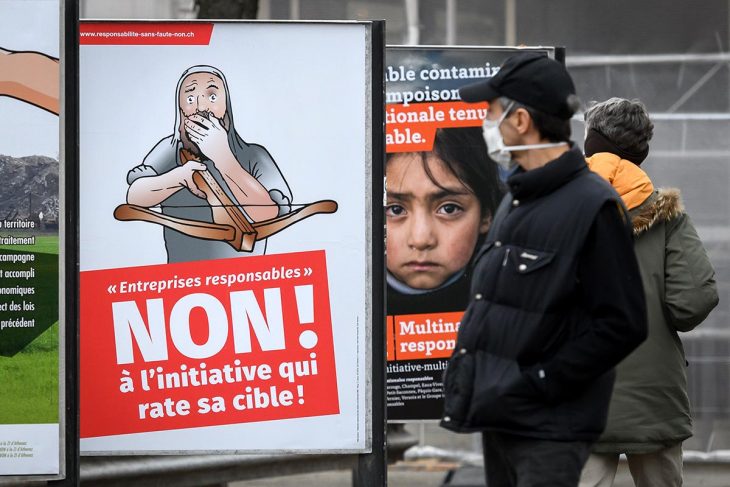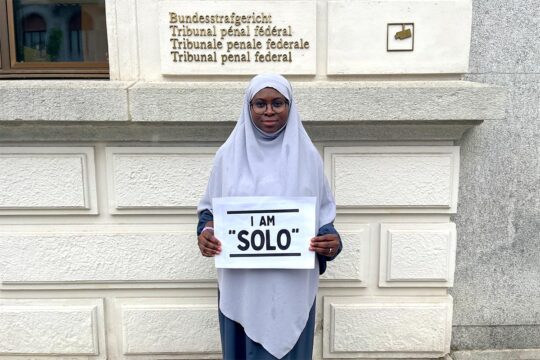On Sunday 29 November, Switzerland voted against the responsible business initiative. Introduced in 2016 by former prosecutor Dick Marty, this text would have created new human rights and environment obligations for all companies or companies above a certain size, Swiss or with seats in Switzerland. These obligations would have applied to the parent company, its subsidiaries and the entire supply chain. They would have consisted of, on the one hand, a duty of diligence including the obligation to produce an annual report, and, on the other hand, liability before the Swiss courts for the wrongful conduct of their subsidiaries and subcontractors abroad dependent on them. In the end, a short popular majority voted in favour of this text at the national level, but a majority of cantons rejected it, so the text is not validated.
The Swiss rejection goes against a movement that has been growing steadily since the Rana Plaza tragedy in Bangladesh in 2013. The collapse of this building, occupied by five garment factories, caused the death of at least 1,132 people and injured more than 2,500. It revealed the confusion of several Western companies who apparently could not tell whether their products were manufactured in one of this building’s workshops. In reaction to this disaster, a series of legislative and regulatory initiatives have flourished in Europe, based on the United Nations Guidelines on Business and Human Rights (UNGP) adopted two years before by the UN Human Rights Committee, with the "due diligence" principle as a keystone.
The British and German examples
In 2015, the United Kingdom introduced a new provision in the Modern Slavery Act. Section 54 requires companies whose turnover exceeds a certain threshold to report on the measures they take to prevent slavery or human trafficking in their supply chains. However, according to an independent review published in May 2019, it would seem that its impact has remained limited. Among the reasons cited were the vagueness of its scope, uncertainties about the content of the mandatory public statement or the absence of a monitoring mechanism to enforce compliance. On the judicial front, the United Kingdom took an important step towards greater corporate accountability in the Vedanta case. In this case, the communities affected by environmental pollution caused by the mining activities of the Zambian subsidiary of this London-based company seized the Supreme Court. In April 2019, the Court ruled in that context that a parent company may owe a duty of care to persons affected by the actions or omissions of a foreign subsidiary. More recently, the government announced its willingness to go further in the fight against illegal deforestation and the protection of tropical forests through the introduction of new laws requiring greater corporate due diligence in this sector.
In Germany, the government adopted in December 2016 a "National Action Plan for the Implementation of the UN Guidelines on Human Rights and Business", or NAP. The NAP warned that if less than 50% of German-based companies with more than 500 employees had engaged in human rights due diligence processes by 2020, they would be required to do so by law. According to the results of a survey reported in the German newspaper HandelsBlatt, less than 20% of the companies concerned had taken the necessary measures in December 2019 to ensure that their suppliers comply with environmental and social standards. The promised law making these measures legally binding was due to be introduced in September; it is currently being disputed over how far up the supply chain the obligation and accountability for suppliers’ wrongdoings should apply.
The French ambition
In France, the law on the duty of vigilance dated March 2017 was revolutionary for corporate accountability. This law requires all parent companies and companies giving orders seated on French territory and satisfying specific criteria in terms of number of employees and turnover, to publish a “plan de vigilance” each year. This plan must present measures designed to identify risks and prevent serious violations of human rights and fundamental freedoms, protect individuals’ health and safety and the environment. It applies to the activities of the mother company, the companies it controls (...) as well as its subcontractors or suppliers with which it has an established commercial relationship, when these activities are connected to this relationship.”
The French law has some similarities with Section 54 of the UK Modern Slavery Act. However, the obligations it creates go beyond modern slavery since the duty of care concerns human rights and the environment in general. Another difference is that the French law provides that a company that does not comply may be held liable before a civil court. Three years after its entry into force, its implementation has already resulted in several ongoing proceedings. Two of them involve the oil company Total for climate change and human rights violations. Casino, a mass-market retail group whose supply chains are allegedly linked to the deforestation of the Amazon, is involved in another one. It is important to note, however, that the implementation of this law depends essentially on civil society’s monitoring efforts and in particular, NGOs such as Amnesty International, Sherpa, Friends of the Earth, Notre affaire à tous, L'envol vert, or even certain local authorities.
The movement is spreading throughout Europe: in the Netherlands, where the parliament passed a bill on "due diligence and child labour" in February 2017; in Italy, Austria and Luxembourg, where governments are also considering legislative proposals requiring companies to exercise equal diligence on human rights and environmental issues.
International logics
At the EU level, the debate is no longer whether or not binding due diligence legislation should be adopted. The EU is expected to adopt a legal framework to this end next year for companies vis-à-vis their subcontractors. In April 2020, Justice Commissioner Didier Reynders announced that the European Commission was preparing a public consultation on this subject, which could serve as a basis for a legislative proposal.
The discussions are now focusing on the precise content of this legislation, which must strike a balance between respect for human rights and environmental standards on the one hand, and entrepreneurial freedom and the right to economic development on the other. A balance difficult to find, given the realities attached to globalisation, which creates competition for various economic actors with different priorities, particularly with respect to social and environmental issues. As Olivier de Schutter and Sharan Burrow explained so well in an opinion published last week, "[some] countries are tempted to further lower social and environmental standards to attract investment, seeking to achieve a competitive advantage by maintaining workers in poverty and by tolerating an extractive use of nature".
While new domestic legislations could contribute in breaking this vicious circle, only an international treaty ratified by a large number of States could avoid to some extent the risks of social and environmental dumping arising from the current form of economic globalisation. It is in this spirit that a draft international treaty sponsored by the United Nations has been under negotiation for the past six years.
Meanwhile, Switzerland now appears to be one train behind schedule, despite the popular support that this initiative has clearly enjoyed. The counter-proposal proposed by the government, without any real binding force, will now apply. Unfortunately, this will not be enough to limit the power of nuisance of companies like Glencore, whose activities have a heavy social and environmental impact throughout the world. Although Switzerland may have missed a great opportunity to contribute to this progress and to a new balance in the North/South relations, one cannot help but hope that this is only an adjournment and that, beyond Switzerland, other initiatives, whether national or international, will eventually bear fruit and bring about a more progressive evolution of corporate responsibility law.
 MAUD SARLIÈVE
MAUD SARLIÈVE
Maud Sarliève is a lawyer and lecturer at the University of Paris-Ouest-Nanterre. She worked for the ECCC Office of Investigating Judges in Cambodia, for the EULEX Special Prosecutors in Kosovo and for a Defence team at the Special Tribunal for Lebanon.





